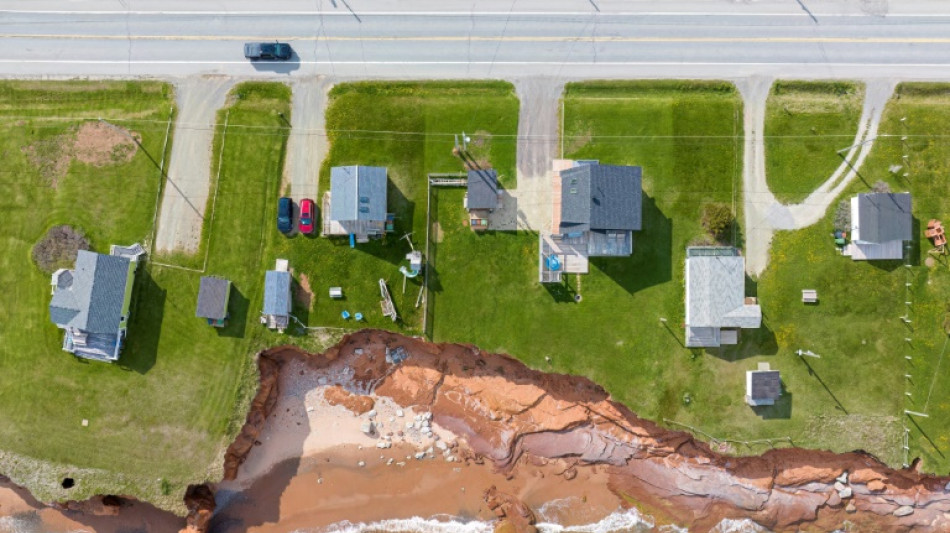
-
 UK royal finances in spotlight after Andrew's downfall
UK royal finances in spotlight after Andrew's downfall
-
Diplomatic shift and elections see Armenia battle Russian disinformation

-
 Undercover probe finds Australian pubs short-pouring beer
Undercover probe finds Australian pubs short-pouring beer
-
Epstein fallout triggers resignations, probes

-
 The banking fraud scandal rattling Brazil's elite
The banking fraud scandal rattling Brazil's elite
-
Party or politics? All eyes on Bad Bunny at Super Bowl

-
 Man City confront Anfield hoodoo as Arsenal eye Premier League crown
Man City confront Anfield hoodoo as Arsenal eye Premier League crown
-
Patriots seek Super Bowl history in Seahawks showdown

-
 Gotterup leads Phoenix Open as Scheffler struggles
Gotterup leads Phoenix Open as Scheffler struggles
-
In show of support, Canada, France open consulates in Greenland

-
 'Save the Post': Hundreds protest cuts at famed US newspaper
'Save the Post': Hundreds protest cuts at famed US newspaper
-
New Zealand deputy PM defends claims colonisation good for Maori

-
 Amazon shares plunge as AI costs climb
Amazon shares plunge as AI costs climb
-
Galthie lauds France's remarkable attacking display against Ireland

-
 Argentina govt launches account to debunk 'lies' about Milei
Argentina govt launches account to debunk 'lies' about Milei
-
Australia drug kingpin walks free after police informant scandal

-
 Dupont wants more after France sparkle and then wobble against Ireland
Dupont wants more after France sparkle and then wobble against Ireland
-
Cuba says willing to talk to US, 'without pressure'

-
 NFL names 49ers to face Rams in Aussie regular-season debut
NFL names 49ers to face Rams in Aussie regular-season debut
-
Bielle-Biarrey sparkles as rampant France beat Ireland in Six Nations

-
 Flame arrives in Milan for Winter Olympics ceremony
Flame arrives in Milan for Winter Olympics ceremony
-
Olympic big air champion Su survives scare

-
 89 kidnapped Nigerian Christians released
89 kidnapped Nigerian Christians released
-
Cuba willing to talk to US, 'without pressure'

-
 Famine spreading in Sudan's Darfur, UN-backed experts warn
Famine spreading in Sudan's Darfur, UN-backed experts warn
-
2026 Winter Olympics flame arrives in Milan

-
 Congo-Brazzaville's veteran president declares re-election run
Congo-Brazzaville's veteran president declares re-election run
-
Olympic snowboard star Chloe Kim proud to represent 'diverse' USA

-
 Iran filmmaker Panahi fears Iranians' interests will be 'sacrificed' in US talks
Iran filmmaker Panahi fears Iranians' interests will be 'sacrificed' in US talks
-
Leicester at risk of relegation after six-point deduction

-
 Deadly storm sparks floods in Spain, raises calls to postpone Portugal vote
Deadly storm sparks floods in Spain, raises calls to postpone Portugal vote
-
Trump urges new nuclear treaty after Russia agreement ends

-
 'Burned in their houses': Nigerians recount horror of massacre
'Burned in their houses': Nigerians recount horror of massacre
-
Carney scraps Canada EV sales mandate, affirms auto sector's future is electric

-
 Emotional reunions, dashed hopes as Ukraine soldiers released
Emotional reunions, dashed hopes as Ukraine soldiers released
-
Bad Bunny promises to bring Puerto Rican culture to Super Bowl

-
 Venezuela amnesty bill excludes gross rights abuses under Chavez, Maduro
Venezuela amnesty bill excludes gross rights abuses under Chavez, Maduro
-
Lower pollution during Covid boosted methane: study

-
 Doping chiefs vow to look into Olympic ski jumping 'penis injection' claims
Doping chiefs vow to look into Olympic ski jumping 'penis injection' claims
-
England's Feyi-Waboso in injury scare ahead of Six Nations opener

-
 EU defends Spain after Telegram founder criticism
EU defends Spain after Telegram founder criticism
-
Novo Nordisk vows legal action to protect Wegovy pill

-
 Swiss rivalry is fun -- until Games start, says Odermatt
Swiss rivalry is fun -- until Games start, says Odermatt
-
Canadian snowboarder McMorris eyes slopestyle after crash at Olympics

-
 Deadly storm sparks floods in Spain, disrupts Portugal vote
Deadly storm sparks floods in Spain, disrupts Portugal vote
-
Ukrainian flag bearer proud to show his country is still standing

-
 Carney scraps Canada EV sales mandate
Carney scraps Canada EV sales mandate
-
Morocco says evacuated 140,000 people due to severe weather

-
 Spurs boss Frank says Romero outburst 'dealt with internally'
Spurs boss Frank says Romero outburst 'dealt with internally'
-
Giannis suitors make deals as NBA trade deadline nears


Canada's Magdalen islands have 'front row' seat to climate change
In the Gulf of Saint Lawrence, on the small Magdalen islands, foot paths are caving in, cliffs are receding and the sand dunes are disappearing, leaving homes vulnerable to the lashing waves.
The archipelago, part of Quebec province in eastern Canada, is in a race against time -- and the elements -- to survive global warming. Residents are feeling the effects of climate change on a daily basis.
"The Magdalen islands are in the front row when it comes to the changes taking place. We are miniscule faced with the immensity of it all," says Mayka Thibodeau from CERMIM, a research center focused on sustainable development.
The changes seem to be coming fast and furious, leaving the roughly 13,000 residents reeling, as they realize their island home will need to adapt quickly and radically in the decades to come if it is to survive.
The islands' picturesque shores have already been eroded, receding by an average of half a meter (1.6 feet) a year, according to a study by the University of Quebec at Rimouski (UQAR).
It's a figure that concerns Diane Saint-Jean and her partner -- they live on the coast and worry the next big storm could sweep their home into the water.
"We were rather naive, we were sure there would be a solution. But nature proved us wrong," says Saint-Jean, her voice shaky as she stares at the nearby cliffs, which are slowly disappearing.
The two women live in La Martinique, a slim band of territory that links the archipelago's two main islands.
They have spent thousands of dollars to reinforce the cliff at the foot of their yard, but in September 2022, Hurricane Fiona struck with brute force, quickly washing away the giant rocks meant to protect their property.
"We woke up one morning and realized we'd thrown away our money. But what can we do?" rues Saint-Jean, a retired nurse.
- Costly emergency work -
Erosion is a bit of a sensitive topic for most residents on the Magdalen islands, which were first populated in the 18th century and are located more than five hours by boat from continental Canada.
Everyone here remembers spots that are now gone -- especially houses that had to be moved because of the risk of flooding.
The situation is a headache for local authorities, who must invest millions of dollars for emergency work.
In Cap-aux-Meules, in the center of town, part of the pedestrian walkway collapsed in 2018, leaving the hospital, a retirement home and a cemetery in the direct path of dangerous waves.
Last year, local authorities built a huge gravel beach, using 143,000 tonnes of stones along an 800-meter (half-mile) stretch to raise the shoreline. It was not the first time the tactic had been used.
"Solutions exist but they are extremely expensive and these projects have to be maintained. So each time we intervene, it's a tax burden for the future," explains Jasmine Solomon, who monitors erosion for the local government.
"We likely won't be able to protect everything. There are spots that are going to need to change, that's for sure."
- Vanishing ice -
In recent years, extreme weather events have become more frequent and more devastating as a result of climate change.
The Magdalen islands are notably losing one of their most important defenses in winter: ice. It has always served as a sort of shield, but without it the coasts are completely exposed when rough storms hit.
With each cycle of freezing and thawing, the red sandstone cliffs crumble more easily.
"One storm can erase a dune, a cliff, or even open up a breach" in the coastline, says Marie-Eve Giroux, the director of local environmental organization Attention Fragiles.
In addition to raising awareness about ecological issues in local schools, her group works on dune restoration, especially by replanting them with beachgrass, which helps keep the sand in place as its roots create a natural net.
Many times, the dunes are the shoreline's only defense against the waves.
The islands are in danger of being lost to rising waters, a fate shared by other low-lying areas around the world. They are also gradually sinking.
"We must look at all realistic scenarios and not bury our heads in the sand," says Thibodeau. "We don't just want to endure what is to come. We want to be part of the solution."
She explains the many projects undertaken by CERMIM to restore the beaches including the use of mollusk shells to make concrete. The idea is to turn the islands into a sort of living laboratory in the global battle against climate change.
For Marianne Papillon, a doctor and public health advisor, the time to act is now.
Papillon has taken up a relatively new job -- tackling climate change-related issues.
"We must do something collectively. Individual action won't make sense if everyone is not on board, " she explains.
"Faced with the storms we are seeing, people must make the mental link with climate change. They must feel more involved, and personally invested, without becoming too stressed about it all."
F.Qawasmeh--SF-PST




